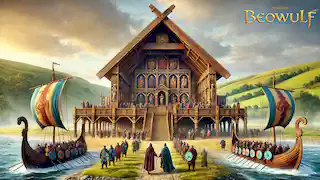Prologue
In the ancient times of England, a realm rich with legends and myths, there existed a kingdom plagued by a monstrous terror. The kingdom of Hrothgar, the noble and wise king, was a place of prosperity and joy, but it was overshadowed by the dark presence of Grendel, a fearsome beast that terrorized the great hall of Heorot.
The Terror of Grendel
Heorot, a magnificent hall built by Hrothgar, was meant to be a place of celebration and merriment. However, every night it became a scene of horror and bloodshed. Grendel, a creature of the night, would emerge from the moors, driven by malice and envy, to wreak havoc upon the hall, killing Hrothgar's warriors and leaving destruction in his wake.
King Hrothgar, despite his wisdom and strength, found himself powerless against the beast. The tales of Heorot's suffering spread far and wide, reaching the ears of Beowulf, a mighty warrior from the land of the Geats. Beowulf, known for his incredible strength and valor, decided to take on the challenge and bring peace to Hrothgar's kingdom.
Beowulf Arrives
Beowulf set sail with his loyal band of warriors, crossing the treacherous seas to reach the shores of Hrothgar's kingdom. They were greeted with suspicion and hope, as the people of Heorot had seen many warriors come and fail. However, Beowulf's confidence and noble demeanor soon won them over.
King Hrothgar welcomed Beowulf with open arms, seeing in him a glimmer of hope that had long been absent. Beowulf pledged to defeat Grendel or die trying, and a grand feast was held in his honor, though the shadow of Grendel loomed over the celebrations.
As the night grew darker, Beowulf spoke with the king, learning more about the horrors Grendel had inflicted upon Heorot. Hrothgar described how the beast had been tormenting them for twelve long years, his attacks unpredictable and savage. Beowulf listened intently, his resolve hardening with every word.
The Battle with Grendel
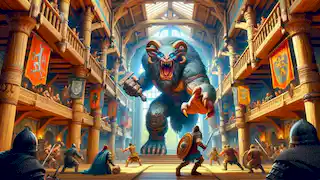
As night fell, Beowulf and his warriors prepared for the inevitable confrontation. The hall of Heorot, once filled with laughter, now echoed with the tense silence of anticipation. Beowulf, refusing to use weapons, chose to fight Grendel with his bare hands, believing that to be a true test of his strength and courage.
Grendel burst into the hall with a fury unmatched, his monstrous form casting a terrifying shadow. The battle was fierce and brutal, but Beowulf's strength was greater than any had imagined. In a climactic struggle, Beowulf managed to overpower Grendel, tearing the beast's arm from its body. Mortally wounded, Grendel fled into the night, leaving behind a trail of blood and despair.
The warriors of Heorot were awestruck by Beowulf's bravery and strength. They celebrated their newfound hero, yet they knew that Grendel's demise was not the end of their troubles.
The Celebration and New Threat
The defeat of Grendel brought immense joy to the kingdom. Heorot was filled with songs of praise for Beowulf, and the once sorrowful hall now radiated with newfound hope. King Hrothgar rewarded Beowulf with treasures and proclaimed him the greatest hero the land had ever known.
However, the joy was short-lived. Grendel's mother, a creature even more fearsome than her son, emerged from her lair in the depths of a dark, haunted mere. Driven by a desire for revenge, she attacked Heorot, claiming the life of one of Hrothgar's most trusted advisors.
The Night Attack
The night was eerily silent as the people of Heorot slept, believing the worst to be over. Grendel's mother, driven by grief and rage, slipped into the hall undetected. She snatched Aeschere, Hrothgar's loyal advisor, and retreated into the darkness. The next morning, the kingdom was thrown into turmoil once more.
King Hrothgar, devastated by the loss of Aeschere, turned to Beowulf for help. Beowulf, understanding the gravity of the situation, assured Hrothgar that he would seek out Grendel's mother and put an end to her reign of terror.
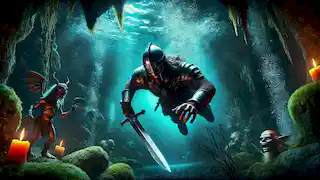
Into the Mere
Undeterred by the new threat, Beowulf vowed to defeat Grendel's mother and bring lasting peace to the kingdom. He prepared himself for the descent into her underwater lair, a place of unimaginable darkness and danger. Clad in armor and wielding a mighty sword, Beowulf dove into the depths of the mere.
The water was cold and murky, with an ominous silence that chilled him to the bone. Beowulf pressed on, navigating the treacherous underwater terrain. As he approached the lair, he felt a presence watching him, a malevolent force waiting to strike.
The battle with Grendel's mother was even more daunting than the first. The murky waters and treacherous terrain made the fight a true test of Beowulf's endurance and skill. Despite the odds, Beowulf's resolve remained unshaken. He found an ancient, powerful sword within the lair and used it to strike down the vengeful creature.
Return to Heorot
Emerging victorious once more, Beowulf returned to Heorot with the head of Grendel's mother as proof of his triumph. The kingdom erupted in celebration, and King Hrothgar proclaimed Beowulf's deeds would be remembered for generations to come.
Beowulf's fame spread far and wide, and his heroism became a beacon of hope and courage. He returned to his homeland, where he eventually became king and ruled wisely and justly for many years.
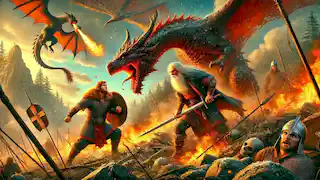
The Golden Years
Under Beowulf's reign, the Geatish kingdom prospered. His leadership brought peace and stability, and his people flourished. Beowulf was not only a warrior but a wise and just ruler, respected by all who knew him.
However, the peace was not to last. Deep within the mountains, a dragon lay dormant, guarding a hoard of treasure. When a thief disturbed the dragon's slumber, the beast awoke with a fury that threatened to destroy everything Beowulf had built.
The Dragon's Challenge
Years passed, and Beowulf's strength and valor remained unmatched. However, a new threat emerged in the form of a dragon, a creature that laid waste to the lands with its fiery breath. Despite his age, Beowulf chose to confront the dragon, determined to protect his people one last time.
The battle with the dragon was fierce and intense. Beowulf, though no longer in his prime, fought with the same courage and strength that had defined his life. With the help of a loyal warrior named Wiglaf, Beowulf managed to slay the dragon, though he himself was mortally wounded in the process.
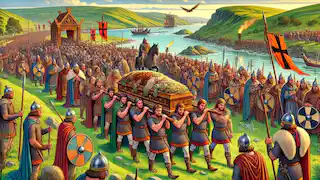
The Final Battle
Beowulf and Wiglaf stood side by side as the dragon roared and breathed fire upon them. The heat was unbearable, and the ground shook with the beast's fury. Beowulf, though weakened by age, fought with all his might, his sword striking the dragon's scales with a force that reverberated through the air.
Wiglaf, inspired by Beowulf's bravery, joined the fray, his own weapon slicing through the dragon's thick hide. Together, they managed to wound the beast, but it was Beowulf's final blow that brought the dragon down. The victory was bittersweet, as Beowulf collapsed from his injuries, knowing his time had come.
Beowulf's Legacy
As Beowulf lay dying, he reflected on his life and the battles he had fought. He was at peace, knowing he had fulfilled his destiny as a hero. His final request was to be buried in a barrow overlooking the sea, so that sailors could see his tomb and remember his deeds.
Beowulf's funeral was a somber and grand affair, befitting the greatest hero the land had ever known. His people mourned the loss of their king but found solace in the legacy he left behind. Songs of Beowulf's bravery and honor were sung throughout the land, ensuring his memory would never fade.
Wiglaf's Ascension
With Beowulf's passing, the responsibility of leading the Geats fell to Wiglaf. Though the task was daunting, Wiglaf had learned much from his fallen king. He vowed to honor Beowulf's memory by ruling with the same wisdom and courage.
Under Wiglaf's leadership, the kingdom continued to thrive. He maintained the peace that Beowulf had fought so hard to achieve and ensured that the stories of Beowulf's heroism were passed down to future generations.
Epilogue
The tale of Beowulf is one of heroism, sacrifice, and the enduring power of courage. His deeds inspired countless others to rise above their fears and face the challenges before them. The kingdom of Hrothgar, forever grateful for Beowulf's bravery, prospered in peace, a testament to the hero who had
saved them from the darkness.
Beowulf's legacy lived on, not just in the hearts of those who knew him, but in the tales told by bards and poets. His story became a symbol of hope and resilience, a reminder that even in the darkest of times, a single hero could make a difference. And so, the legend of Beowulf continued to inspire, echoing through the ages as a beacon of light in a world often shrouded in shadow.
